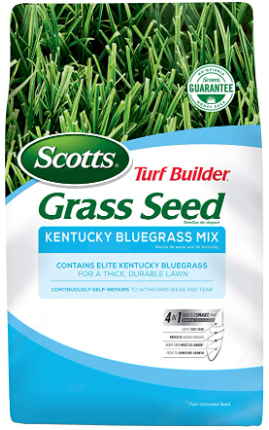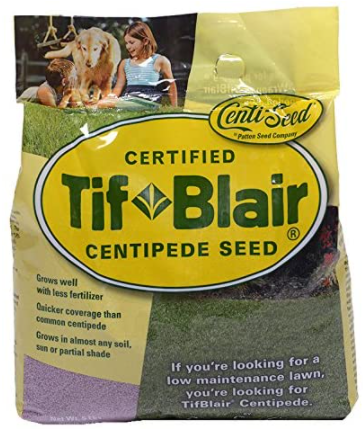- Popular Types of Bermuda Grass Explained - April 21, 2022
- When to Mow New Grass - April 18, 2022
- Best Troy Bilt Push Mower: How to Find The Right One - April 25, 2021
Undoubtedly lush and lovely lawns do way more than beautifying a yard. With the perfect grass, you can mitigate any cases of soil and wind erosion.
It will also aid in filtering groundwater as well as enhance the environment’s air. Besides, more rainfall will be absorbed, benefiting breathing and reducing asthma. That way, this article seeks to give a review of the best grass seeds to grow in North Carolina with some tips and a little buying hereto.
What is the climate of North Carolina? – Understanding North Carolina
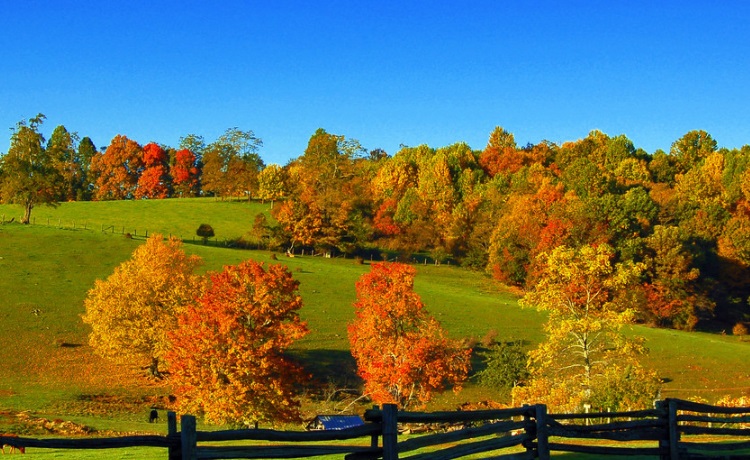
Comprehending North Carolina is crucial for a lawn owner to know what best grass types can thrive without a major hassle.
Undeniably the state is peculiar in its way. Firstly this state possesses three regions and each region is different from the other in terms of soil properties and climate. These regions are inclusive of the Coastal Plains, Piedmont, and the Mountains.
The mountainous region has somewhat cooler weather with clay soil compared to the other two; thus, grasses that can thrive in the cool-season will best grow here.
On the other hand, the Coastal Plains have sandy soil and are best for warm-season grasses that can easily tolerate salty water and soil.
Lastly, Piedmont regions are a mixture of the above two; thus, plants that can thrive in the cool season and the warm season will grow well here. Knowing your area and the soil type as an NC resident is crucial before preparing your yard.
What grasses thrive best in NC?
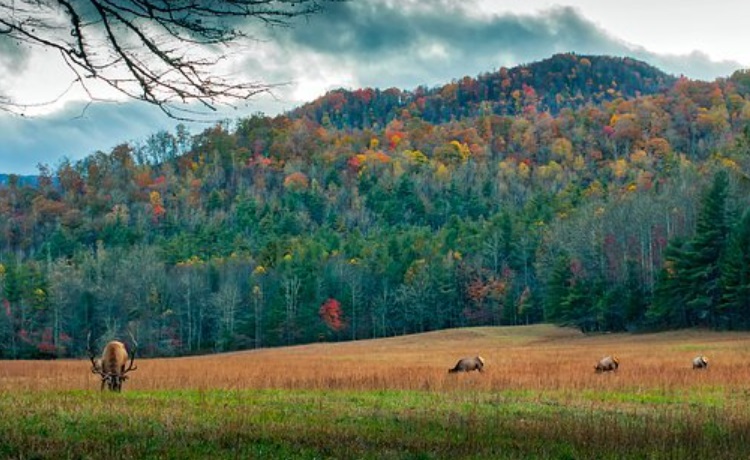
As earlier mentioned, the grass seed that will grow best in NC is wholly dependent on the specific region. Nonetheless, some grasses can grow well in several areas and germinate successfully because they’re easygoing. Such grasses are vital, mostly if you reside in a place that borders another region and has unpredictable weather.
Grasses that grow in NC are inclusive of warm-season grass-like carpet, Centipede, Zoysia, and Bermuda grass that can also grow well in the wet and shady parts.
These grasses are usually lush green in summer, then turn dormant and brown in winter. They’re adapted to the piedmont and coastal plains’ sandy soil. Also, they adapt well to summer droughts and high temperatures in NC compared to cool-season grass seeds.
The cool-season grasses like the tall turf fescue are usable in places wherein green turf is needed all year round. On the other hand, Ryegrass is utilized for over-seeding, typically the warm season types of grass in NC. Bearing in mind this crucial information, here are types of grasses based on various seasons.
Warm-Season types of Grasses
Zoysiagrass
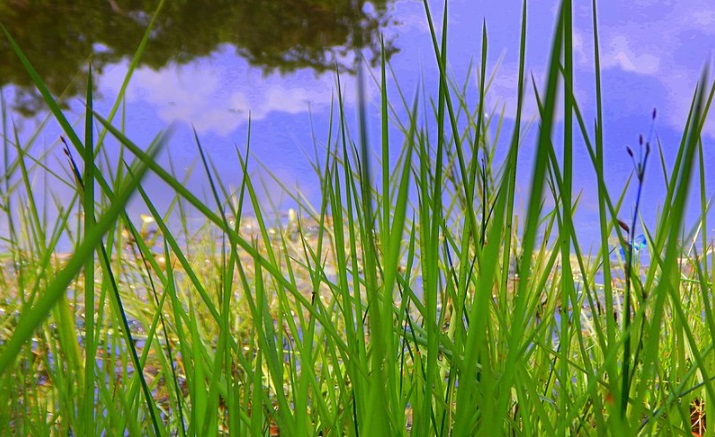
It is a warm-season type that thrives well in high temperatures and forms an aesthetically pleasing turf in all of NC, making it useful for a typical home lawn.
Zoysiagrass possesses a fine to medium leaf texture with a medium-light green color. Via producing thick extensive rapidly stolen, it possesses a desirable recuperative potential. However, it sometimes spreads to places it isn’t desired.
It functions best on well limed fertile soil with moderate moisture, although it is still drought tolerant. Poorly drained soils cannot sustain it. Heavy frosts affect its chlorophyll rendering it dormant until early summer or late spring.
Bermuda Grass
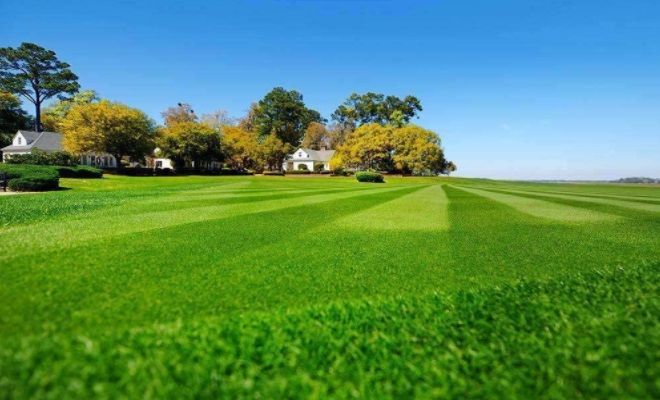
The grass is frequently used, and it is adapted most throughout the entire state. There have been novel and enhanced seed varieties that have been developed in the past ten years.
Currently, users have a plethora of finer and even denser choices compared to the commonest now extinct Bermuda grass seed.
Courtesy of their rhizomes and stolons, they tend to spread hence invading gardens and flower beds aggressively. Also the cold-tolerant vegetative and seeded varieties are currently existential.
Centipede Grass
Centipede grass has a medium to pale green color and is medium-textured too. It grows gradually, but you can highly rely on them to produce a lush, healthy weed-free dense with low maintenance turf.
Although it is highly aggressive, it can be controlled quickly and needs edging once annually. Besides, it can grow well in low fertility yet responds warmly to excellent care.
Cool-Season types of Grasses
Tall fescue – Turf Type
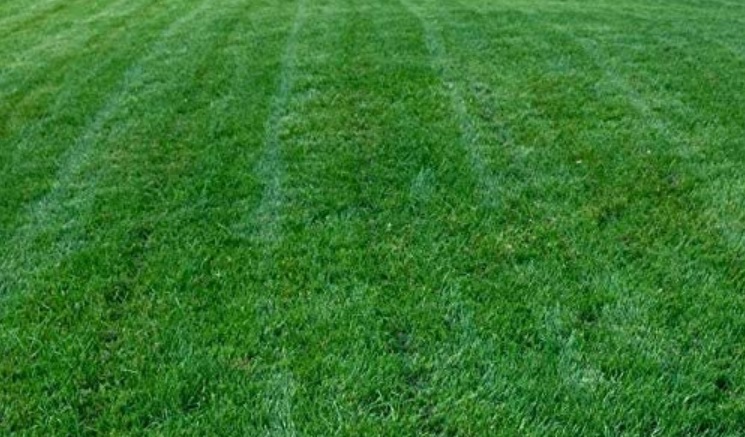
The Tall fescue grass is durable and persistent that forms desirable turf for athletic fields, playgrounds, parks, grounds, as well as home lawns.
Also, it is utilized in areas that require low maintenance like fairgrounds, highway medials, utility areas as well as airstrips. Several improved varieties are darker in green color with very high tiller densities and finer textures. This is unlike the light green and coarse-textured varieties like the Alta and Kentucky 31.
It is considered to be undeniably incompatible with fine fescues, perennial Ryegrass, darker green, and fine-textured Kentucky bluegrass. This objectionable mixture is because it forms clumps that are coarse-textured in uniform stands.
It is typically a bunch grass type that occasionally forms short rhizomes and is somehow gradual to establish extensively rich root systems and recovery potential.
Compared to other species, it is the most droughts and heat tolerant making it possible to produce deep root systems. Also, it performs impressively in sunny and open areas having moderate shade tolerance. It doesn’t suit well in heavily shaded areas but does well in perfectly drained soil.
Check out how Fescue compares to Bermudagrass and find your perfect match.
Kentucky bluegrass
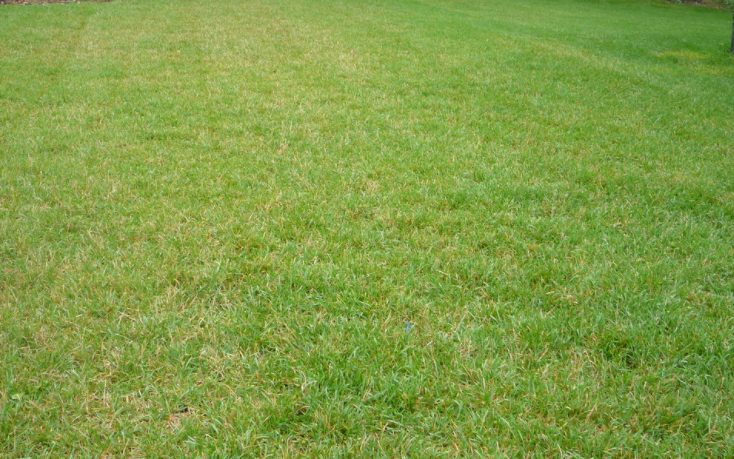
The Kentucky bluegrass, which is known for being an attractive and persistent species, is standard in athletic fields, parks, institutional grounds, home lawns, etc.
It possesses a fine to medium leaf texture as well as a dark green medium color when it is adequately fertilized. Via producing, rhizomes can provide well sod making characteristics and high recuperative potential than other turfgrasses.
The Kentucky bluegrass tends to be drought-tolerant, moderately heat and wear tolerant, and can do well in cold areas. Also, it can grow well in fall periods and spring then gradually turns semi-dormant during prolonged drought and heat. It also recovers speedily from dormancy when satiating soil moisture and cooler temperatures advent.
Perennial Ryegrass
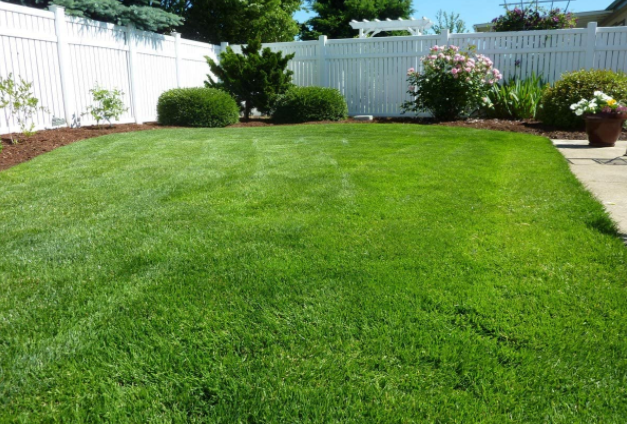
Famous Ryegrass is usually medium to fine-textured with a persistent greenish color. It is utilized in athletic fields, golf courses, grounds, parks, home lawns et al. the species forms a habitual bunch growth type without stolons or rhizomes. It doesn’t possess a solid recuperative potential like the Kentucky bluegrass.
However, the Perennial Ryegrass rapidly germinates, about 5 days from being planted and establishes quite remarkably.
With a very competitive nature, it is used for overseeding other damaged or stunted turf. Due to its aggressiveness, you cannot use over 20% in mixtures. It is best grown alone or even in a mix with fine fescues as well as Kentucky bluegrass because they possess some similar characteristics.
Additionally, it is both heat and wears tolerant. However, it is moderately susceptible to drought and shade as well as to low temperatures. Nonetheless, it is prone to ice damage. With well-drained types and very fertile soils, you will witness Ryegrass performing impeccably. In NC, it is only used to have the Bermuda grass overseed.
When do you need to plant the grass seeds?
The grass seed to plant will be dependent on the selected variety and the region you live as earlier mentioned. For instance, cool-season grass varieties that grow well in the Mountain region will be best planted in early fall or late summer.
On the other hand, warm-season varieties that work in Coastal Plains should be planted the entire spring until early summer. Should you live in the Piedmont regions, you can produce a mixture of both varieties in early spring. Overseeding should be done in the fall to get an attractive all year round lawn.
Buying guide for the best NC grass seeds
Quality
Undoubtedly there are several varying grass seeds of acceptable quality—however, the grass seeds you want to purchase need to pass stipulated EU germination and purity standards.
The grass seeds need to be a minimum of 80% pure. If you can find a bag that meets Higher Voluntary Standard, HVS with 96.5% purity, you need to buy it.
Acidity
When selecting the best lawn groundcover, it is wise to comprehend the soil’s pH. With soil testing strips and kits, you can quickly determine it. Some foliage can tolerate any conditions.
However, other varieties such as Kentucky bluegrass need a neutral soil range of your soil while Centipede and Zoysia do well in acidic soils, albeit slightly lower than 5.
Texture
It is only right to ensure that the grass you select is best for the soil’s texture in the place you will be planting in. various textures are like coarse and light.
Feel it to know the texture of the grass seed using your forefingers and thumb. Soil texturing is effortless and straightforward to do before planting.
Top 6 best grass seeds to grow in NC Review
1. Jonathan Green 40322 Black Beauty Ultra Grass Seed
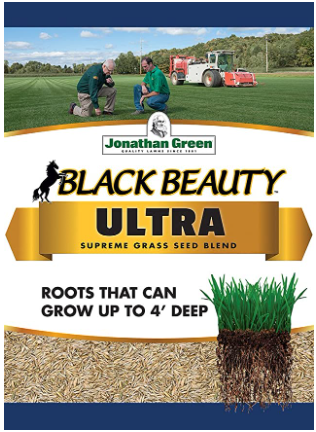
The seeds speedily germinate and fill gaps nicely wherein damaged lawns exist. What’s impressive about it is that it brings forth lush, attractive dark green grass uniformly.
You can expect it to thrive in heat, pests, and drought-stricken places. It is famous for being a protective coating that best grows in the sun and shade.
Also, it copes perfectly with lots of traffic after it has naturally developed. Apart from that, you will experience substantial growth and thicker grass.
To achieve this, you need to prepare your soil and opportune peat moss adequately. You cannot go wrong with the Jonathan Green 40322 in North Carolina.
Features
- The roots grow to 4ft deep to become drought tolerant
- Seed readily into the existential lawn.
- Suited perfectly to sunny and shady areas
- Seeds germinate in a week.
Pros
- Heat and insect resistant
- Does impeccably in various climates
- Wards off diseases courtesy of the wax coating.
- Preserves moisture in its leaves to ascertain supreme drought tolerance
Cons
- Birds love the seeds hence it becomes a problem germinating.
2. Kentucky 31 Tall Fescue Grass Seed
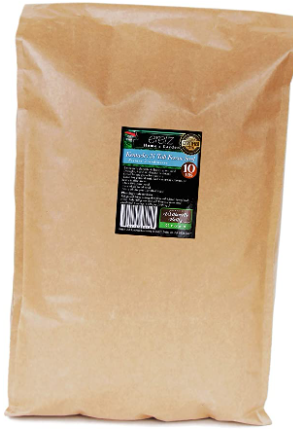
Kentucky 31 Tall Fescue grass seed can successfully grow to about 7mm and are basically egg-shaped and long. You can plant it during spring to expect it to cover 1000sq.ft. or over 6lbs sized bags. Seeds sprout in summer then gradually turn into glossy green lush blades that are 6 inches.
Kentucky thrives well in clay and sandy soils with good drainage. You can mow it after it attains 3 inches and water it bi-weekly. Fertilizer has to be applied in summer.
Kentucky is used to repair pet caused burn spots and you can seldom experience problems with weeds. In 45days, you will experience it growing lush. With constant watering and care, you will appreciate these grasses.
Features
- Accredited and tested as 98% pure
- Impeccable forage grass
- Great for application which regularly copes with abuses such as foot traffic.
- Extremely durable and is a hardy grass seed
Pros
- Disease, drought, and weed resistant
- It is certified
- Possesses solid reputation for being authenticity and quality
Cons
- Birds fancy these seeds
3. GroSMART Turf Type Tall Fescue Blazing Blues Grass Seed
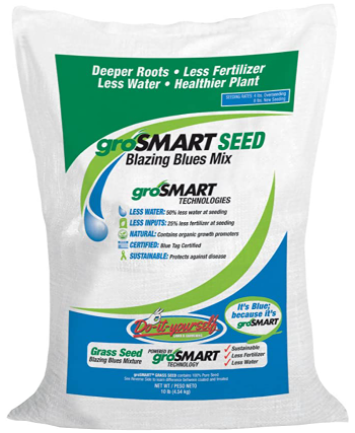
Homeowners fancy being outside as they tinker around on lawns—moreover, some lawn owners like a healthy-looking lawn can hold interesting outdoor excursions.
This is where groSMART comes in handy in making lawn owners and homeowners’ dreams come true. These seeds feature several attributes that can help develop an impeccable root system leading to a lovely lawn eventually.
GroSMART Turf Type Tall Fescue grass seed can accommodate transitional zones; hence you needn’t water it because it germinates speedily.
Within three weeks, you will witness its superb growth courtesy of enhanced root development as well as speedy germination. groSMART’s patented treatments provide superior organic nutritional importance whenever and wherever it’s needed.
Features
- Its groSMART technologies ascertain healthy root depth
- Germinates in 3 days
- Produces healthier and sustainable lawns
- It is a bio-organic treated variety
Pros
- Possesses blue tag implying certification
- Possesses organic growth enhancers and promoters
- Needs less than 50% water when seeding
Cons
- Sometimes sprouting takes a bit longer
4. Scotts Turf Builder Grass Seed – Kentucky bluegrass Mix
Following in the list is the famous Scotts Turf Builder seed Kentucky grass who outdid themselves in developing a novel grass variety.
True enough, the seeds grow greener and are tolerant to harsh sun, shade as well as drought. It is best to mitigate chances of weeding via using specialized same ranged products. While weeds work differently, you need to wait until novel grass is occasionally mowed before applying weed controlling products.
You can best plant this grass in spring or fall because 60-80 degrees Fahrenheit favors it. Don’t doubt investing in this brand if you need to be establishing or overseeding your lawn. .it’s an excellent grand selection that can benefit in various places.
Features
- This brand proliferates greener and even thicker compared to other grass types.
- Featuring WaterSmart Plus technologies of coating, the Seed allows water to absorb easily
- It protects itself from diseases
- Repairs itself from heat, drought as well as damage.
Pros
- Holds impeccably in high feet areas
- Multiplies in conducive climates
- It is cold-tolerant
- Can also tolerate sunny and shaded areas in North Carolina.
Cons
- If you’re not watchful during seeding, birds might dine on them
5. Midnight Kentucky Bluegrass Seed
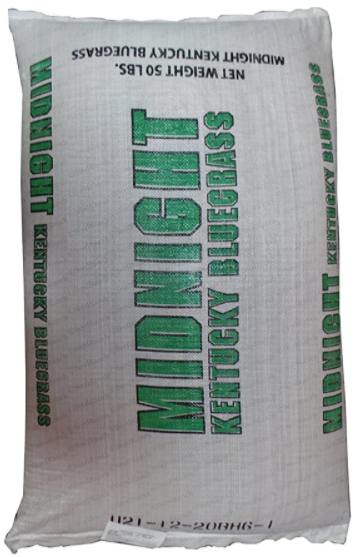
Moving on swiftly is the famous midnight Bluegrass seeds which form full-blown rich lush in very lovely lawns. The midnight Kentucky easily withstands athletic field abuses.
It has proven itself an amazing cultivar that possesses exceptional resistance to leaf spot, stem rust, and stripe smut. Homeowners and gardeners that wish great turf qualities can rely on midnight Kentucky bluegrass seeds wholly.
Sod producers will also adore its growth characteristics because it requires less maintenance and minimal mowing sessions. It is also noteworthy that it can cover up to 300 square feet in an area.
Its prominent features are its nice dark green-blue color which gives off a vibrant color with low maintenance. Besides, it exhibits exceptional heat and drought tolerance. Do not forget to prepare the soil before planting the seeds adequately.
This will ensure that the grass seeds can grow in a short period of about two weeks into a full-blown lawn. You cannot go wrong with the Midnight Kentucky Bluegrass Seed. It is also highly recommended to homeowners residing in North Carolina.
Features
- You can mix it well with the Fescue grass and it will thrive still.
- It has exhibited over 15 years as a top-notch, reliable brand
- Obtains full-blown maximum results because it is certified organically
- Possesses a dark green-blue color in nature too
- Extensive growth up to 3000 square feet.
Pros
- It is best in cool climatic regions of North Carolina
- You can use it on sod blends, parks, landscapes, and professional landscapes
- Versatile usage
- It features an excellent tiller density
- Has a lovely dark blue-green color
Cons
- It may germinate slowly
6. TifBlair Centipede Grass Seed
Unequivocally the best is reserved for the last. Undoubtedly, TifBlair Centipede can be used in landscape projects, home lawns, parks, amongst other uses and purposes.
What’s cool about the TifBlair is that you do not need to mow it compared to other yards on the list occasionally. Also, it tends to germinate hence rendered as a highly aggressive lawn type quickly.
Apart from that, its crazy germination rate can even choke out weeds. It is also an excellent choice for yards that are located in North Carolina, USA.
Moreover, it tolerates colder conditions impressively and can grow longer and run more compared to the typical Centipede. In regards to how many seeds you can plant, it is essential to note that you should not skimp because you will spend a lot of time eventually watering and weeding.
Features
- Requires low maintenance
- Possesses speedy coverage because of its rapid seed germination
- It has a coarse to medium texture
- Ideal in low pH soils
Pros
- It produces attractive and very dense weed resistant turf
- Geese and deer do not get attracted to it
- Its deep extensive root system is remarkable even with poor soil conditions
- Recovers speedily when water conditions don’t become favorable
Cons
- Can sometimes take long to recovers
FAQs
Answer: Fine fescue, perennial ryegrass, Kentucky bluegrass, and tall fescue are some of the cool-season types of perennial grasses utilized in the Piedmont and Mountain region lawns. Types stay green throughout winter, unlike the warm season grass types.
Answer: Professionals typically use Kentucky bluegrass and smart seed pro type of tall fescue. A mixture of these can be grown too.
Answer: Yes. However, apart from merely throwing grass seeds down, you may need to care for the lawn. There is an entirely different world about lawn care. It is noteworthy that the grass mightn’t grow if you hadn’t prepared the yard earlier and didn’t perform any maintenance.
Answer: Fall is the most incredible time you can overseed your NC lawn. In Fall, soil temperatures remain warm hence promoting seed germination. On the other hand, cooler temperatures are best suited for grass growth only. However, warm-season types of weeds are a bit dormant during this season.
Answer: Perennial ryegrass is the toughest grass seed you can plant in NC. With it, you can curate hard-wearing yards for racetracks, show-grounds, football pitches et al.
Conclusion
All said and dusted; we think the best NC grass seed is the Midnight Kentucky grass seed. This is because you can even mix it with Tall Fescue and it will still produce an impeccable lawn.
It is also tolerant to several harsh conditions and exhibits a mouth opening color of blue-green that vibrates well in a dark time. It is essential to know the region you are in NC, to know the best grass for you. You should also prepare your lawn adequately to have a thriving looking lush lawn.
Read more about finding the best grass seed if you live in:


